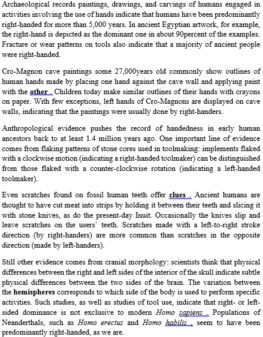Read the following passage and mark the letter A, B, C or D on your answer sheet to indicate the correct answer to each of the questions from 35 to 42
In the United States, it is important to be on time, or punctual, for an appointment, a class, a meeting, etc... This may not be true in some other countries, however. An American professor discovered this difference while teaching a class in a Brazilian university. The two-hour class was scheduled to begin at 10 a.m, and end at 12 a.m. On the first day, when the professor arrived on time, no one was in the classroom. Many students came after 11 a.m. Although all of the students greeted the professor as they arrived, few apologised for their lateness. Were these students being rude? He decided to study the students’ behavior.
In American university, students are expected to arrive at the appointed hour. On the other hand, in Brazil, neither the teacher nor the students always arrive at the appointed hour. Classes not only begin at the scheduled time in the United States, but they also end at the scheduled time. In the Brazilian class, only a few students left the class at noon, many remained past 12:30 to discuss the class and ask more questions. While arriving late may not be important in Brazil, neither is staying late.
The explanation for these differences is complicated. People from Brazilian and North American cultures have different feelings about lateness. In Brazil, the students believe that a person who usually arrives late is probably more successful than a person who is always on time. In fact, Brazilians expect a person with status or prestige to arrive late, while in the United States, lateness is usually considered to be disrespectful and unacceptable. Consequently, if a Brazilian is late for an appointment with a North America, the American may misinterpret the reason for the lateness and become angry.
As a result for his study, the professor learned that the Brazilian students were not being disrespectful to him. Instead, they were simply behaving the appropriate way for a Brazilian student in Brazil. Eventually, the professor was able to adapt his own behavior to feel comfortable in the new culture.
Why did the professor study the Brazilian students’ behaviour?
A. None of the students apologized for their lateness.
B. He wanted to understand why the students came late.
C. He wanted to make the students come to class on time.
D. The students seemed very rude to him.




Chọn B
Tại sao vị giáo sư nghiên cứu hành vi của sinh viên Brazil?
A. Không một sinh viên nào xin lỗi vì đến muộn.
B. Ông ấy muốn hiểu lí do sinh viên đến muộn.
C. Ông ấy muốn sinh viên đến lớp đúng giờ.
D. Sinh viên có vẻ vô lễ với ông ấy.
Ý chính của đoạn văn là tầm quan trọng của việc đúng giờ tuỳ thuộc vào mỗi quốc gia. Và một vị giáo sư qua thời gian dạy học tại Brazil đã nghiệm ra điều này. Khi ông đến lớp đúng giờ, sinh viên chưa đến. Họ đến muộn và chào thầy, nhưng lại có vẻ như không thấy có lỗi và ít ai xin lỗi. Ông băn khoăn liệu điều này có phải bất nhã và ông quyết định nghiên cứu hành vi của sinh viên. Và đoạn cuối kết lại bằng việc vị giáo sư nghiệm ra rằng không phải sinh viên thiếu tôn trọng mình, mà họ chỉ cư xử theo lẽ thường ở Brazil.
Từ đó, ta thấy, việc nghiên cứu hành vi của sinh viên Brazil là do vị giáo sư muốn hiểu lí do họ đến muộn, từ đó rút ra sự khác biệt về quan điểm của các quốc gia, không phải do ông thấy sinh viên có vẻ bất nhã, vô lễ. Như vậy, ta chọn B. Với các đáp án khác:
A sai vì “few apologised for their lateness”, không phải “none of the students apologised”
Đáp án C không được đề cập.